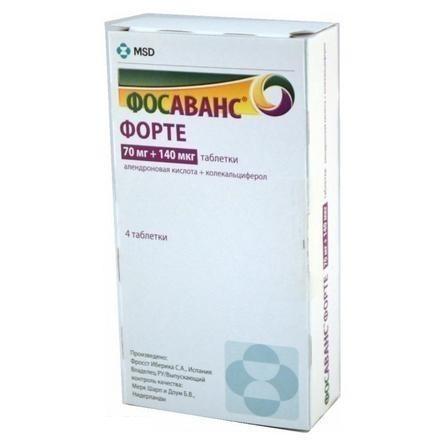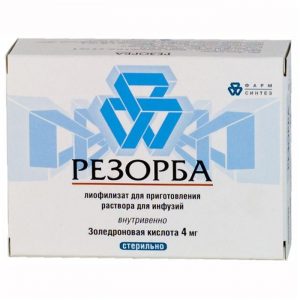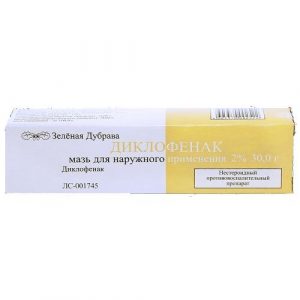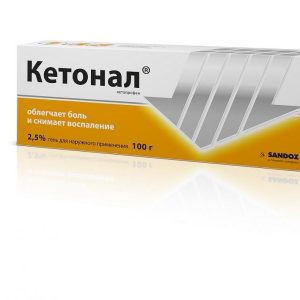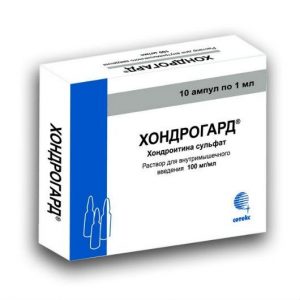Description
Release form
Tablets.
Packaging
4 tablets.
Pharmacological action
Fosavans Forte – an inhibitor of bone resorption in osteoporosis. Sodium alendronate refers to bisphosphonates – compounds that, localized in areas of active bone resorption, under osteoclasts, inhibit the process of bone resorption caused by osteoclasts, without directly affecting the formation of new bone tissue. Since bone resorption and the formation of new bone tissue are interconnected, bone formation also decreases, but to a lesser extent than resorption, which leads to a progressive increase in bone mass. During treatment with sodium alendronate, normal bone tissue forms, into the matrix of which alendronate is embedded, remaining pharmacologically inactive. In therapeutic doses, alendronate does not cause osteomalacia.
Colecalciferol is produced in the skin by converting 7-dehydrocolecalciferol to vitamin D3 when exposed to ultraviolet light. In the absence of sunlight, vitamin D3 is an indispensable component of food. Vitamin D3 is metabolized to 25-hydroxyvitamin D in the liver, where it accumulates. Its conversion to the active calcium-mobilizing hormone 1,25-dihydrovitamin D (calcitriol) occurs in the kidneys and is carefully regulated. The principal mechanism of action of 1,25-dihydrovitamin D is to increase the intestinal absorption of calcium and phosphates, as well as the regulation of plasma calcium, excretion of calcium and phosphate by the kidneys, the formation of bone tissue and its resorption.
Vitamin D3 is essential for normal bone formation. Vitamin D deficiency develops with inadequate exposure to sunlight and / or dietary errors. Vitamin D deficiency is associated with a negative calcium balance, bone loss, and an increased risk of fractures. In acute cases, vitamin deficiency is associated with secondary hypoparathyroidism, hypophosphatemia, myasthenia gravis, osteomalacia, a further increase in the risk of falls and fractures in patients with osteoporosis.
Pharmacokinetics
Absorption
Sodium alendronate
The bioavailability of sodium alendronate at a dose of 5-70 mg when taken orally on an empty stomach no later than 2 hours before a standard breakfast is 0.64% in women and 0.6% in men.
When taking sodium alendronate on an empty stomach 1-1.5 hours before a standard breakfast, bioavailability is reduced by approximately 40%.
In patients with sodium osteoporosis, alendronate is effective when used on an empty stomach, no later than 30 minutes before the first meal or liquid.
The bioavailability of sodium alendronate is negligible when administered concurrently with a meal or within 2 hours after a meal.
Concomitant use with coffee or orange juice reduces the bioavailability of the drug by approximately 60%.
When taking prednisone at a dose of 20 mg 3 times a day for 5 days, there is no clinically significant change in the bioavailability of sodium alendronate.
Colecalciferol
When using Fosavans after an early morning fasting 2 hours before a standard breakfast, the average AUC0-120 hours for vitamin D3 is 296.4 ng x h / ml.
Cmax of vitamin D3 in blood plasma is 5.9 ng / ml. The average time to reach Cmax of vitamin D3 in blood plasma is 12 hours.
Bioavailability of 2800 IU of vitamin D3 in the Fosavans tablet is similar to the bioavailability of 2800 IU of vitamin D3 with an isolated dose.
Distribution of
Sodium alendronate
The average Vd in equilibrium (excluding bone tissue) is at least 28 liters. When taken in therapeutic doses, the concentration of the drug in the blood plasma is negligible (less than 5 ng / ml). The binding of sodium alendronate to plasma proteins is approximately 78%.
Colecalciferol
After absorption in the intestine, vitamin D3 enters the blood as part of chylomicrons and is rapidly distributed mainly to the liver. Smaller amounts of vitamin D3 are distributed into adipose and muscle tissue, where they are cumulated in their native form for further gradual release into the bloodstream. Vitamin D3 circulates in the bloodstream, bound to a vitamin D-binding protein.
Metabolism
Sodium alendronate
There is no evidence that sodium alendronate is metabolized in humans or animals.
Colecalciferol
Vitamin D3 is rapidly metabolized by hydroxylation in the liver to 25-hydroxyvitamin D3 (the main form of vitamin accumulation) and is gradually metabolized in the kidneys to 1.25-dihydroxyvitamin D3, which is the active form of vitamin. Before the vitamin is removed, it is further hydroxylated. A small amount of vitamin D3 undergoes glucuronidation before excretion.
Excretion of
Sodium alendronate
After a single intravenous administration of sodium alendronate labeled with 14C, approximately 50% of the drug is excreted in the urine for 72 hours. Excretion of the labeled preparation with feces was insignificant or not detected. After a single intravenous administration of sodium alendronate at a dose of 10 mg, its renal clearance is 71 ml / min. 6 hours after intravenous administration, the plasma concentration decreases by more than 95%. The final T1 / 2 exceeds 10 years, which reflects the release of the drug from bone tissue.
Colecalciferol
When taking radioactive vitamin D3 in healthy individuals, the average excretion of the radioactive drug with urine after 48 hours was 2.4%, with feces – 4.9% after 4 days. In both cases, the drug was excreted mainly in the form of its metabolites. T1 / 2 of vitamin D3 after oral administration of Fosavans is approximately 24 hours.
Indications
For the treatment of postmenopausal osteoporosis in patients who are additionally not taking vitamin D drugs and are at risk for developing vitamin D deficiency. The drug reduces the risk of vertebral and hip fractures to increase bone mass in men with osteoporosis.
Contraindications
diseases of the esophagus, slowing down its emptying, for example, strictures or achalasia
inability to sit or stand upright for 30 minutes
hypersensitivity to any component of the
hypocalcemia
severe mild renal failure 35 ml feeding
childhood (up to 18 years)
severe hypoparathyroidism
severe vitamin D deficiency
calcium malabsorption
hereditary lactase deficiency, sucrose / isomaltase deficiency, glucose-galak malignant malabsorption.
With caution
for exacerbation of diseases of the upper gastrointestinal tract, such as dysphagia, diseases of the esophagus, gastritis, duodenitis or gastric ulcer (including anamnestic information about peptic ulcer, active gastrointestinal bleeding, surgery in the upper gastrointestinal tract within a year before taking Fosavans forte).
for diseases associated with overproduction of calcitriol (leukemia, lymphoma, sarcoidosis) and concomitant hypercalcemia and / or hypercalciuria.
Use during pregnancy and lactation
The drug Fosavans forte is intended for the treatment of women only in the postmenopausal period and is contraindicated in pregnancy and during breastfeeding.
Pregnancy
There are no data on the use of the drug Fosavans forte during pregnancy. Animal studies of alendronate have not revealed a direct damaging effect on pregnancy, development of the embryo / fetus, or postnatal development. The use of alendronate in rats during pregnancy caused a violation of labor due to hypocalcemia. Animal studies show hypercalcemia and reproductive toxicity with high doses of vitamin D.
Breastfeeding
It is not known whether alendronate passes into breast milk. Colecalciferol and some active metabolites pass into breast milk.
Fertility
Bisphosphonates are incorporated into bone tissue from which they are gradually released over many years. The amount of bisphosphonate that can be incorporated into the bone and thus enter the systemic circulation is directly proportional to the dose and duration of bisphosphonate administration. There are no data on the risk to the fetus in humans, but there is a theoretical risk of damage to the fetus, especially the bone skeleton, if pregnancy occurs at the end of the bisphosphonate course. The influence of such variables, as the length of the period between discontinuation of bisphosphonate therapy and conception, the specific type of bisphosphonate and route of administration (intravenous or oral) in relation to this risk has not been studied.
Composition
1 tablet contains:
active substances: alendronic acid 70 mg, colecalciferol 140 mcg.
Dosage and administration of
1 tablet, at least 30 minutes before the first meal, liquid or medicines (including antacids, calcium preparations and vitamins), washed down with a full glass of plain water (not mineral water). Other drinks (including
mineral water), food, and certain medicines may decrease the absorption of Fosavans forte.
To reduce the risk of irritation of the esophagus, Fosavans forte should be taken according to the following rules: Take it in the morning immediately after getting out of bed, at least 30 minutes before the first meal, liquid or medicine, with a full glass of water (not mineral) to facilitate the intake of tablets in the stomach.
Do not chew tablets or dissolve them in the mouth due to possible formation of ulcers in the mouth and throat. Patients should not go to bed before the first meal, which should be made at least 30 minutes after taking Fosavans forte.
Fosavans forte should not be taken before bedtime or before getting out of bed.
The recommended dose is 1 tablet of Fosavans forte once a week.
Patients should additionally take calcium supplements if its dietary intake is insufficient. Fosavans forte meets the weekly need for vitamin D based on a daily dose of 800 ME.
For elderly patients and patients with mild to moderate renal failure (CC from 35 to 60 ml / min), dose adjustment is not required. The recommended dose is 1 tablet of Fosavans forte once a week.
If you accidentally skip taking the drug, you need to take 1 tablet in the morning of the next day. Do not take 2 doses on the same day, but in the future you need to return to taking the drug 1 time per week on that day of the week that was chosen at the beginning of treatment.
Side effects
The most commonly reported adverse reactions are adverse reactions from the upper gastrointestinal tract, including abdominal pain, dyspepsia, esophageal ulcer, dysphagia, bloating and acid belching ( 1/100, <1/10). The following adverse reactions have been reported during clinical trials and / or post-marketing use of alendronate. Additional adverse reactions to the drug Fosavans forte have not been established. The frequency of adverse reactions is set as follows: very frequent (> 1/10) frequent (> 1/100, <1/10) infrequent (> 1/1000, <1/100) rare (> 1/10000, <1 / 1000) very rare (<1/10000). Immune system disorders Rare: hypersensitivity reactions, including urticaria and angioedema Metabolism and nutrition disorders Rare: symptomatic hypocalcemia, often due to predisposition factors 1 Nervous system disorders Frequently: headache, dizziness2 Infrequent: taste impairment2 Visual disturbances Infrequent: eye inflammation (uveitis, scleritis, episiscleritis) Hearing impairment and labyrinth disorders Frequent: systemic dizziness, 2 Disorders constipation, diarrhea, flatulence, esophageal ulcer3, dysphagia3, bloating, sour belching Infrequent: nausea, vomiting, gastritis, esophagitis3, esophageal erosion3, melena2 Rare: esophageal stricture3, ulceration, ulceration cts, ulcers, bleeding of the upper gastrointestinal tract1, gastroesophageal reflux Disorders of the skin and subcutaneous tissues Frequent: alopecia 2, itching 2 Infrequent: skin rash, erythema Rare: skin rash with photosensitivity, severe including Stevens-Johnson syndrome and toxic epidermal necrolysis 4 Disorders of the musculoskeletal and connective tissue Very frequent: musculoskeletal (bone, muscle or joint) pain, sometimes severe pain 1.2 Frequent: swelling of the joints 2 Rare: jaw osteonecrosis1 , atypical, underfold and diaphyseal hip fractures (undesirable reaction of the bisphosphonate class) 5 General disorders and disorders at the injection site Frequent: asthenia2, peripheral edema2 Infrequent: transient symptoms like acute phase reaction ( myalgia, malaise, and rarely fever), usually in connection with the start of treatment2 1 See Special Instructions 2 In clinical trials, the frequency was comparable for the drug group and placebo group. 3 See sections Dosage and administration and Special instructions 4 This adverse reaction was established during post-marketing surveillance. The frequency of “rare” has been established based on relevant clinical studies. 5 Installed in post-marketing applications. Drug Interaction Alendronate Suction of alendronate may be impaired if the drug is taken at the same time as food, beverages (including mineral water), calcium, antacids, and other oral medications. In this regard, the interval between taking Fosavans Forte and other medicines taken internally should be at least 30 minutes. Since the use of NSAIDs is associated with the development of erosive-ulcerative lesions of the gastrointestinal tract, caution should be exercised when NSAIDs and alendronate are used simultaneously. Colecalciferol Olestra, mineral oils, orlistat, as well as bile acid sequestrants (cholestyramine, colestipol) may make it difficult to absorb vitamin D. Anticonvulsants, cimetidine, thiazide diuretics may accelerate catabolism of vitamin D. Overdose Alendronate Hypocalcaemia, hypophosphatemia and undesirable effects from the upper gastrointestinal tract are possible: overdosage: dyspepsia, heartburn, esophagitis, gastritis, gastric and esophageal ulcers. There is no specific treatment for alendronate overdose. If you overdose on Fosavans Forte, you should take milk or antacids to bind alendronate. Vomiting should not be caused to avoid irritation of the esophagus. Patients should remain upright. Colecalciferol Vitamin D toxicity was not observed in healthy adults at chronic doses below 10,000 IU per day. In clinical trials involving healthy adults, the intake of vitamin D3 at a daily dose of 4000 ME for 5 months did not cause hypercalciuria and hypercalcemia. Storage conditions In the dark place at a temperature of no higher than 25 ° C. Expiration of 18 months. active ingredients Alendronovaya acid, Kolekaltsyferol pharmacies pharmacy terms for dosage form dosage form tablets Merck Sharp and Doom BV, United States
